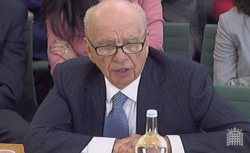Murdoch's Enemies

During Tuesday's parliamentary hearing, News Corp. CEO and Chairman Rupert Murdoch rope-a-doped his way through dozens of questions about the phone-hacking scandal. Questions he couldn't rope-a-dope, he deflected to his corner man, son James.
But Murdoch was eager to punch back when the questions interested him. About a fourth of the way through the three-hour-plus session, MP Jim Sheridan asked whom he blamed for the closure of News of the World and the collapse of Murdoch's bid for the 61 percent portion of satellite broadcaster BSkyB that he doesn't already own.
Perking up, Murdoch said:
A lot of people had different agendas, I think, in trying to build this hysteria. All our competitors in this country formally announced a consortium to try and stop us. They caught us with dirty hands and they built the hysteria around it.
It sounds like a paranoid's ravings, but Murdoch is absolutely right about the existence of a consortium of competitors. Executives representing the Daily Telegraph, the Daily Mail, the Guardian, the Daily Mirror, the BBC, Channel 4, and the BT Group came together in October 2010 to lobby regulators against Murdoch's BSkyB bid. Their letter that stated, "We believe that the proposed takeover could have serious and far-reaching consequences for media plurality."
The Financial Times didn't sign the letter but had editorialized (subscription required) in September 2010 about how the government must bring Murdoch "to heel" and block the takeover. The FT further speculated that fear of Murdoch's press power was deterring British politicians from investigating the scandal.
Much of the those rivals' animus for Murdoch is due to his fiercely competitive ways. His restlessness, inventiveness, and risk-taking have driven them batty as he has upended business as usual time and again ever since he arrived in the U.K. in 1968. He's the man who broke the unions, who modernized newspaper production, and whose price-cutting forced other publishers to follow. He's the entrepreneur who took on billions in losses to start a U.K. satellite-broadcasting company. They hate him, in part, because they've never had the brains or the guts to compete against him.
Murdoch is also hated by government regulators who have sought to undo him and failed. One of Murdoch's biggest enemies included Vince Cable, the regulator in charge of assessing the mogul's fitness to purchase the remainder of BSkyB. Cable opposed the purchase but was removed from the BSkyB proceeding last December after he was caught on tape by undercover reporters saying he had "declared war on Mr. Murdoch." As Murdoch goes down, he should be proud of having made such wonderful enemies.
Other Murdoch enemies are petty ones he has created for reasons only his shrink could explain. Of his fellow London newspapermen, the genocidal tyrant once said, "I am sober after lunch, and in some parts of Fleet Street, that makes you a genius." Other Murdoch enemies hate him because he hates them and uses his publications to express that hatred. As Spectator columnist Alex Massie tells me, Murdoch despises all establishments and practically all institutions—the BBC, Parliament, the "royal" family, the New York Times, patricians, and practically anybody who doesn't conform to his populist self-image. "He respects brashness," Massie says, "and hates anything that smacks of patronizing." For this reason, among others, Murdoch adored Margaret Thatcher.
No comments:
Post a Comment